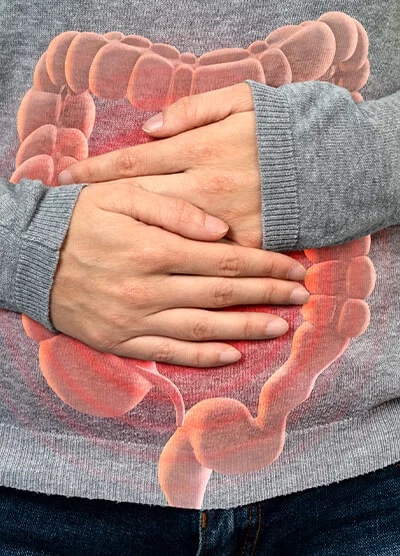- Dr AG Jeetoo Hospital (Civil)
Port Louis, Mauritius - Mon - Sat 8.00 - 18.00.
Sunday CLOSED
Luminal GI
The two main categories of diseases we see are: Luminal GI and Hepatology. Luminal GI conditions can be further divided into those affecting the Upper GI and lower GI.

Upper GI Diseases
Patients often experience symptoms like stomach pain, acid reflux, nausea, and vomiting, collectively known as dyspepsic symptoms. These can stem from various underlying issues, making it crucial to conduct a gastroscopy, regardless of age. Helicobacter pylori (H. pylori) infection is a common culprit, detectable during gastroscopy, and typically treated with antibiotics.
Less commonly, we encounter inflammation or ulcers in the oesophagus, stomach, or duodenum, sometimes causing severe bleeding. Previously, surgical intervention was necessary, but modern endoscopic techniques allow for effective, minimally invasive treatment. Even frail elderly patients benefit from these advancements, significantly reducing mortality associated with upper GI bleeding.
Upper GI cancers, though rare, can affect any part of the upper GI tract. Oesophageal cancers may manifest as swallowing difficulties or weight loss, necessitating biopsies and potentially stent placement to alleviate symptoms before further treatment.
Stomach cancers often present with symptoms like difficulty swallowing, nausea, and weight loss, and are managed through biopsies and referrals to surgical and oncological specialists. Primary duodenal tumors are exceedingly rare, with the duodenum typically affected by hepatobiliary tumors. Pancreatic or cholangiocarcinomas, causing jaundice and possibly duodenal invasion, are usually managed through ERCP procedures, with placement of a biliary stent, to relieve jaundice, facilitating subsequent treatment.
Lower GI Diseases
GI diseases affecting the last 120cm of the GI tract are very different compared to those affecting the upper 120cm. Lower GI disease tend to present with symptoms like constipation, diarrhea, rectal bleeding, or abdominal pain. To examine this area, we perform a colonoscopy, which is important regardless of your age.
Younger patients tend to have inflammatory bowel diseases (IBD) like Ulcerative Colitis or Crohn’s Disease. These conditions cause inflammation in the colon and sometimes the small bowel, visible during colonoscopy as redness and ulcers. The cause is not well defined but its incidence is increasing with adoption of a more Westernised diet and we are seeing IBD in children as young as 8 years old. Treatment usually involves lifelong medication to control symptoms, and surgery is only necessary if medications are ineffective.

In older patients, we commonly find polyps or, more rarely, colon cancer. Polyps are growths that can become cancerous, so we remove them during colonoscopy to prevent complications. Most polyps can be removed endoscopically, but we may avoid removal if the risks are very high, in which case, we will discuss with you before proceeding. In general, with modern endoscopic methods, most polyps can be removed safely and effectively, avoiding surgery.
Colon cancer presents with changes in bowel habits, bleeding, or weight loss. At colonoscopy, we will biopsy the lesion and treatment entails referral to surgical and oncological specialists. If the cancer is very advanced, we will place a colonic stent to prevent colonic obstruction. Colon cancer is common in both genders and more frequent on the left side of the colon. It's the third most diagnosed cancer in Mauritius, but with prompt diagnosis and treatment, the three-year survival rate is approximately 75%. Regular screenings like colonoscopies are vital for early detection and better outcomes.
Irritable bowel Syndrome

IBS, or Irritable Bowel Syndrome, is a common condition characterized by various upper and lower GI symptoms despite normal endoscopy results. It can mimic other GI issues, making accurate diagnosis crucial for appropriate treatment. While its exact cause is unclear, factors like poor diet, lack of exercise, and stress may contribute.
Managing IBS involves a team effort, including gastroenterologists, dieticians, and sometimes psychiatrists. Though symptoms can significantly impact daily life, the risk of serious GI conditions, including cancers, is lower in IBS patients, possibly due to regular monitoring and treatment. If you're experiencing persistent GI symptoms, it's important to discuss them with your healthcare provider for proper evaluation and management tailored to your needs.

